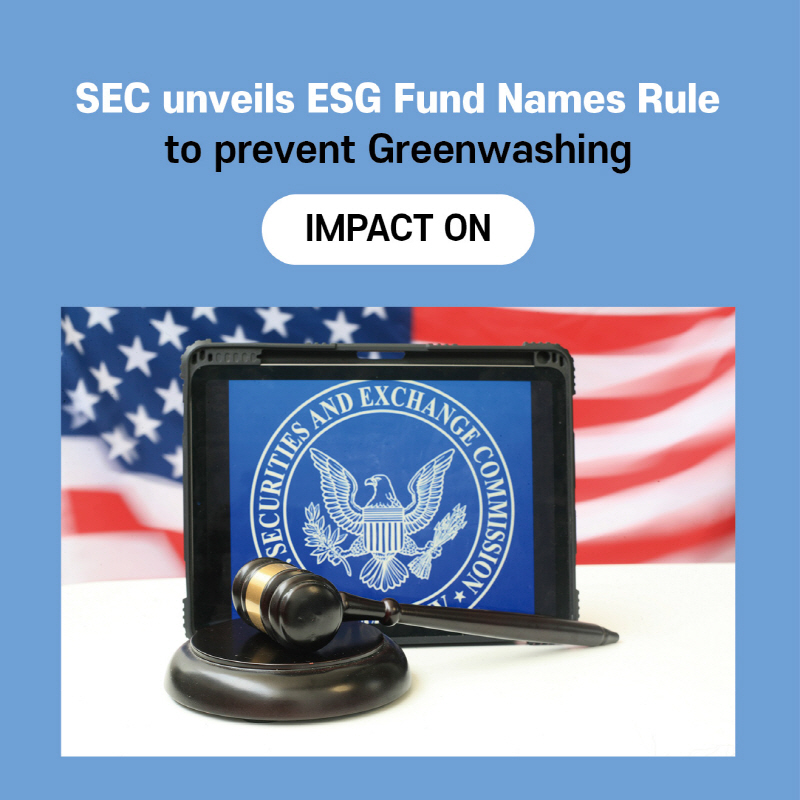
The U.S. Securities and Exchange Commission (SEC), which operates to establish order in the capital market and protect investors, announced an amendment to the "Names Rule" on the 25th of last month to remove ESG funds with high risk of greenwashing from the financial market.
The first information investors encounter when choosing an investment product is the name of the fund. By looking at the name of the fund, the investor can guess for what purpose and where the fund will be invested.
In the 2000s, the SEC, which found many fund names contrary to the purpose of investment as the fund market revitalized, acknowledged that fund names could mislead investors and adopted the name rule (35d-1 rule) in 2001.
The rule enacted in 2001 requires mutual funds and exchange-traded funds to invest at least 80% of their assets in the investment type, industry and geographic location their names suggest. For example, if a fund’s name includes “U.S. Bond,” the Names Rule requires it to invest at least 80% of its assets in domestic bonds.
However, years ago, criticism began to rise that the ‘35d-1 rule’ could not cover the current market level. At the heart of it is the ESG fund. This is because there are growing concerns in the industry that the greenwashing risk increases as the name of the ESG fund currently traded does not match the actual investment.
Greenwashing refers to a case in which a product's environmental attributes or efficacy are falsely or exaggerated, and thus economic benefits are made only by eco-friendly images. As some funds advocating ESG invest in fossil fuel or sinful stocks, those funds are criticized and warned because only their names are ESG, not real ones.

As a result, the SEC announced that it would revise the "Names Rule" in 2020 and released the revision of the rule on the 25th after collecting opinions on the revision.
The goal of "names rule" of SEC, which will be revised for the first time in 20 years, is "Modernization of the 80 percent." The plan is to actively reflect the fund market, which has changed significantly from 20 years ago, and to regulate more funds according to "names rule" than before to remove funds that mislead investors and disrupt the market with greenwashing.
Under the existing names rule, financial derivatives and convertible bonds, which are currently actively traded in the financial market, are out of the regulatory scope. In addition, in the case of funds invested in emerging industries, it was difficult to concentrate more than 80% of the investment due to high business risks and insolvency, so they often avoided the existing names rule.
However, the proposed regulation should be expanded to "all funds," and if the name of the fund implies an investment area, target, and purpose, the fund issuer should come up with an investment policy that more than 80% of the recruitment funds will be invested in the element. In particular, it applies to the use of 'value' or 'growth' in the name of the fund, and to the use of any word of ESG (environmental, social, governance). For example, if the fund name includes the word 'environment', the issuer should have a strategic policy of investing more than 80% in projects or projects that enhance environmental performance.
In addition, the SEC has announced its plan to apply funds that are not listed on the stock exchange to the rules. Closed-end funds or BDCs (Business Development Company) that are not listed on the exchange cannot unilaterally change their existing policy of investing more than 80% in elements related to the name of the fund unless they have been voted by shareholders.
The amendment proposes to thoroughly disclose the 80% investment policy of the fund name. The issuer must provide the SEC with a "fund prospectus disclosure" containing the definition of the fund name.
In line with this, ‘Form N-PORT’, which is the fund's quarterly report, will also be revised. Funds that are obligated to report Form N-PORT must transparently report how the name of the fund matches the actual investment, according to the revised format.
In principle, the "80% investment policy under the name of the fund" released by the issuer is maintained without changing the contents, but if some changes occur without touching the basic contents, the fund investor must be notified.
The most stringent requirement in this amendment is the use of the 'ESG' name. In the case of funds with strong non-ESG investment characteristics, ESG is not allowed in the name even if ESG characteristics are partially included in the scope of investment. The use of ESG under the fund name means that it will be thoroughly prevented because there is a high risk of misunderstanding and greenwashing.
An SEC official said, "We estimate that this rule will affect 75% of all funds," adding, "If ESG is not the investment core, the fund will be banned from using ESG labels."

On the same day, the SEC also announced 'ESG Disclosures' and expressed its intention to strictly manage and supervise greenwashing and ESG false risks in the ESG investment market.
ESG disclosure regulations apply to financial firms (operators), collective investment organizations, investment advisors registered on the stock exchange, and investment advisors which are not registered on the stock exchange. In other words, all financial firms that create and operate ESG investment products or act as advisors must implement ESG disclosures in accordance with the regulations.
Common disclosures should be made such as ▲ Fund's ESG strategy ▲ How ESG elements are integrated when making investment decisions ▲ How the fund elects agents or cooperates with companies in ESG issues. Financial firms should provide comparable information about ESG products in their investment product guides, annual reports, or advisory brochures.
SEC Chair Gary Gensler said in a statement, "We are pleased to have come up with this because the adoption of this regulation will strengthen the disclosure of funds and advisors marketing ESG." "As ESG has a variety of investment methods and strategies, I think investors need to understand what's inside these strategies," he said. "This regulation is essential because it's the SEC's mission to protect investors and allocate capital efficiently."
ESG Disclosures, which was unveiled along with the Fund Name Rule, will be adopted after a 60-day comment period.
[Global ESG_Now] 미국 증권거래위원회(SEC), 그린워싱 막기 위해 ‘ESG 펀드 이름 규칙’ 공개
자본시장의 질서 확립과 투자자 보호를 위해 운영되는 증권거래위원회(SEC)가 그린워싱 리스크가 높은 ESG 펀드를 금융 시장에서 퇴출시키기 위해 ‘펀드 이름 규칙(Name’s Rule)’ 개정안을 지난달 25일 발표했습니다.
투자자가 투자 상품을 선택할 때 가장 먼저 접하는 정보가 펀드 이름입니다. 펀드 이름을 보고, 투자자는 이 펀드가 어느 목적으로, 어느 곳에 투자될 것인지 가늠할 수 있습니다.
2000년대 펀드 시장이 활성화되면서 투자 목적과 다른 펀드명을 다수 발견한 SEC는 펀드명이 투자자를 오도할 수 있다는 점을 인정하고, 2001년 이름 규칙(35d-1 규칙) 만들어 채택한 바 있습니다.
2001년에 만들어진 규칙은 뮤추얼 펀드 및 상장지수펀드에 국한시켜 해당 펀드명과 실제 투자 운용이 80% 이상 관련성이 있어야 한다는 내용을 담고 있습니다. 예를 들어, 펀드명에 ‘미국 채권’이 들어가 있을 경우, 조달된 자금의 80% 이상이 ‘미국 지역 내’에 투자되어야 합니다.
그런데, 수년전부터 이 35d-1 규칙이 현재 시장 수준을 아우를 수 없다는 비판이 제기되기 시작했습니다. 그 중심에는 ESG 펀드가 자리잡고 있습니다. 현재 거래되는 ESG 펀드의 펀드명과 실제 투자가 부합되지 않아 그린워싱 리스크가 커진다는 업계의 우려가 높아지고 있기 때문입니다.
그린워싱이란 상품의 환경적 속성이나 효능에 관한 표시나 홍보가 허위 또는 과장되어서, 친환경 이미지만으로 경제적 이익을 취하는 경우를 말합니다. ESG를 표방한 일부 펀드들이 화석연료 사업 또는 죄악주에 투자하면서, ‘무늬만 ESG’라는 비판과 경계를 받고 있는 것입니다.
이에 따라, SEC은 2020년 ‘이름 규칙’을 전면 개정하겠다고 발표하고 개정 내용에 대한 의견 수렴을 거쳐, 25일 규칙 개정(안)을 공개하게 된 것입니다.
20년만에 개정되는 SEC의 ‘이름 규칙’ 목표는 ‘80% 현대화(Modernization of the 80 percent)’입니다. 20년 전과 확연히 달라진 펀드 시장을 적극 반영해, 전보다 많은 펀드를 ‘이름 규칙’으로 규제해 투자자를 오도하고 그린워싱 등으로 시장을 교란시키는 펀드를 퇴출시키겠다는 것입니다.
기존 이름 규칙에서는 현재 금융 시장에서 활발히 거래되고 있는 파생상품펀드, 전환사채 등이 규제망에서 벗어나 있습니다. 또 신흥산업에 투자되는 펀드의 경우, 높은 사업 리스크와 불건전성으로 투자액의 80% 이상을 집중시키기 어려워 기존 이름 규칙을 피해가는 경우가 많았습니다.
하지만 이번에 제안된 규정안은 ‘모든 펀드’로 확대시켜, 펀드명에 투자 지역, 대상, 목적 등이 암시된 경우 펀드 발행자는 모집 자금의 80% 이상이 해당 요소에 투자될 것이라는 투자 정책을 마련해야 합니다. 특히 펀드명에 '가치(value)', '성장(growth)'을 사용하는 경우를 비롯해, ESG(환경, 사회, 지배구조) 중 한 단어라도 사용할 경우도 적용됩니다. 예를 들어, 편드명에 ‘환경’이라는 단어가 포함된 경우, 발행자는 환경 성과를 높이는 사업 또는 프로젝트 등에 80% 이상을 투자하겠다는 전략 정책을 마련해야 합니다.
또, SEC는 증권거래소에 상장되지 않는 펀드도 규칙에 적용시키겠다는 방침을 개정안에 담았습니다. 거래소에 상장되는 않은 폐쇄형펀드(closed-end fund)나 집합투자기구(BDC)는 주주 투표를 거치지 않은 한, 펀드명과 관련한 요소에 80% 이상 투자하겠다는 기존 정책을 일방적으로 바꿀 수 없습니다.
개정안은 펀드명의 80% 투자 정책을 철저하게 공시하도록 제시했습니다. 발행인은 펀드 이름 정의(definition) 등을 담은 ‘펀드 설명 공시(fund prospectus disclosure)’를 SEC에 제공해야 합니다.
이에 발맞춰, 펀드 실적 분기보고서인 ‘Form N-PORT’도 개정될 방침입니다. Form N-PORT 보고 의무가 있는 펀드는 개정된 형식에 따라, 펀드명이 실제 투자와 어떻게 일치하는지를 투명하게 보고해야 합니다.
발행인이 공개한 '펀드명의 80% 투자 정책'은 내용 변경없이 유지되는 것이 원칙이지만, 기본적 내용을 건드리지 않는 선에서 일부 내용이 바뀔 경우 반드시 펀드 투자자에게 통지하도록 했습니다.
본 개정안에서 무엇보다 엄격히 요구되는 것은 ‘ESG’ 명칭 사용입니다. 비(非)ESG 투자 성격이 강한 펀드의 경우, 투자 범위 내에 ESG 성격이 일부 포함되더라도 명칭에 ESG를 쓰지 못하도록 했습니다. 펀드명의 ESG 사용은 오해의 소지와 그린워싱 우려가 높기 때문에 이를 철저하게 막겠다는 뜻입니다.
SEC 관계자는 “이 규칙이 전체 펀드의 75%에 영향을 미칠 것으로 추산한다”며 “ESG가 투자 핵심이 아닐 경우, 펀드가 ESG 라벨을 사용하는 것이 금지될 것”이라고 밝혔습니다.
같은 날, SEC는 ‘ESG 투자상품의 새로운 공시 규정안(ESG Disclosures)’’도 함께 발표하고, ESG 투자 시장에서 그린워싱과 ESG 허위 리스크를 엄격히 관리 및 감독하겠다는 뜻을 내비췄습니다.
ESG 공시 규정안은 증권거래소에 등록된 금융사(운용사), 집합투자기구(BDC), 투자자문사(investment advisers)를 비롯해 거래소에 등록되지 않은 투자자문사에 적용됩니다. 즉, ESG 투자상품을 만들어 운용하거나 자문 역할을 하는 모든 금융업체들은 규정안에 따라 ESG 공시를 이행해야 합니다.
공통적으로 공시되어야 하는 내용은 ▲펀드의 ESG 전략 ▲투자 결정시 ESG 요소 통합 방법 ▲ESG 이슈에 있어 펀드가 대리인을 선출하거나 기업과 협력하는 방법 등입니다. 금융사들은 투자 상품 안내서, 연례 보고서 또는 자문 브로셔 등에 ESG 상품에 대한 비교 가능한 정보를 제공해야 합니다.
게리 겐슬러(Gary Gensler) SEC 위원장은 성명을 통해 “이 규정안이 채택되면 ESG를 마케팅하는 펀드사 및 자문사의 공시가 강화될 것이기에 이를 마련하게 된 것을 기쁘게 생각한다”고 밝혔습니다. 더불어 그는 “ESG에는 다양한 투자 방식과 전략이 존재하기 때문에 투자자들이 이러한 전략 내부에 무엇이 있는지 자세히 파악할 필요가 있다고 생각한다”며 “투자자를 보호하고 자본을 효율적으로 할당하게 하는 것이 SEC의 사명이기 때문에 본 규정안은 필수적이다”라고 강조했습니다.
특정 유형의 투자를 암시하는 이름의 ESG 펀드라면 해당 유형에 자산의 최소 80%를 투자토록 한 ‘펀드 이름 규칙안’과 함께 공개된 “ESG 투자상품 공시 규정안”은 60일의 여론 수렴 기간을 거친 후 채택될 계획입니다.
